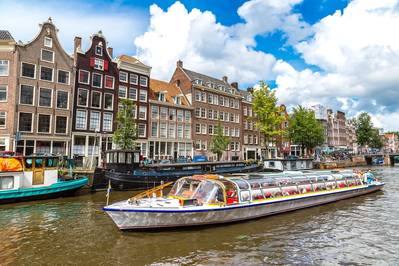Amsterdam's Boats Go Electric Ahead of 2025 Diesel Ban
The century-old Amsterdam canal boat Gerarda Johanna looks like a classic with wood paneling, but beneath its floorboards lies a high-tech underbelly: rows of lithium ion batteries, 66 in all, with an electric drive train powering its propeller.
The boat is part of a push by Amsterdam’s new Green Party mayor to ban diesel engines from the center’s ancient canals by 2025, helping the city’s efforts to combat climate change.
The transition among commercial vessels is well underway, with 75% of the 550 on the city’s water qualifying as emissions free, according to city spokesman Wouter Keuning.
Canal boats were a natural fit to go first. They are Amsterdam’s most popular tourist attraction, each in use up to 14 hours per day, with 320 of them conveying nearly 4 million passengers through the city’s waters annually.
The Gerarda Johanna has its own berth and charging station.
“People always overestimate what they can do in one year, but they underestimate what they can do in 10-20 years,” said Kees Koolen, founder of Super B, the company that supplied the batteries used in the Gerarda Johanna.
He said cheaper solar energy and new forms of storage would bring about emission-neutral transportation faster than most are expecting.
Converting ships like the 1922 Gerarda Johanna takes equal parts engineering and artistry.
It would cost a million euros ($1.1 million) to build a new electric canal boat, but owner Rederij Kooij, one of the city’s largest operators, is converting its existing fleet one by one as they come up for maintenance, adding around 50,000 euros to a 150,000 euro repair bill. So far 13 out of 29 are done.
Kooij monitors its fleet, including battery levels, from a modern control booth inside an old stone building near Amsterdam’s Dam, where spice-laden ships rolled in from the East Indies in the 1600s.
Of Amsterdam’s 12,000 recreational boats, mostly smaller privately-owned vessels, only 5% are emissions-free, by city estimates.
Converting them to electric would cost 4,000-40,000 euros depending on size, though many will likely be sold or replaced.
“The city is actively involved with rolling out the installation of chargers, which is a rather complex project” Keuning said.
The city is working with contractors to have 100 boat charging stations installed by the end of 2021, as well as a floating charging station launched by startup Skoon Energy this week, expected to help with grid balancing.
(Reporting by Toby Sterling; Editing by Alexandra Hudson)














